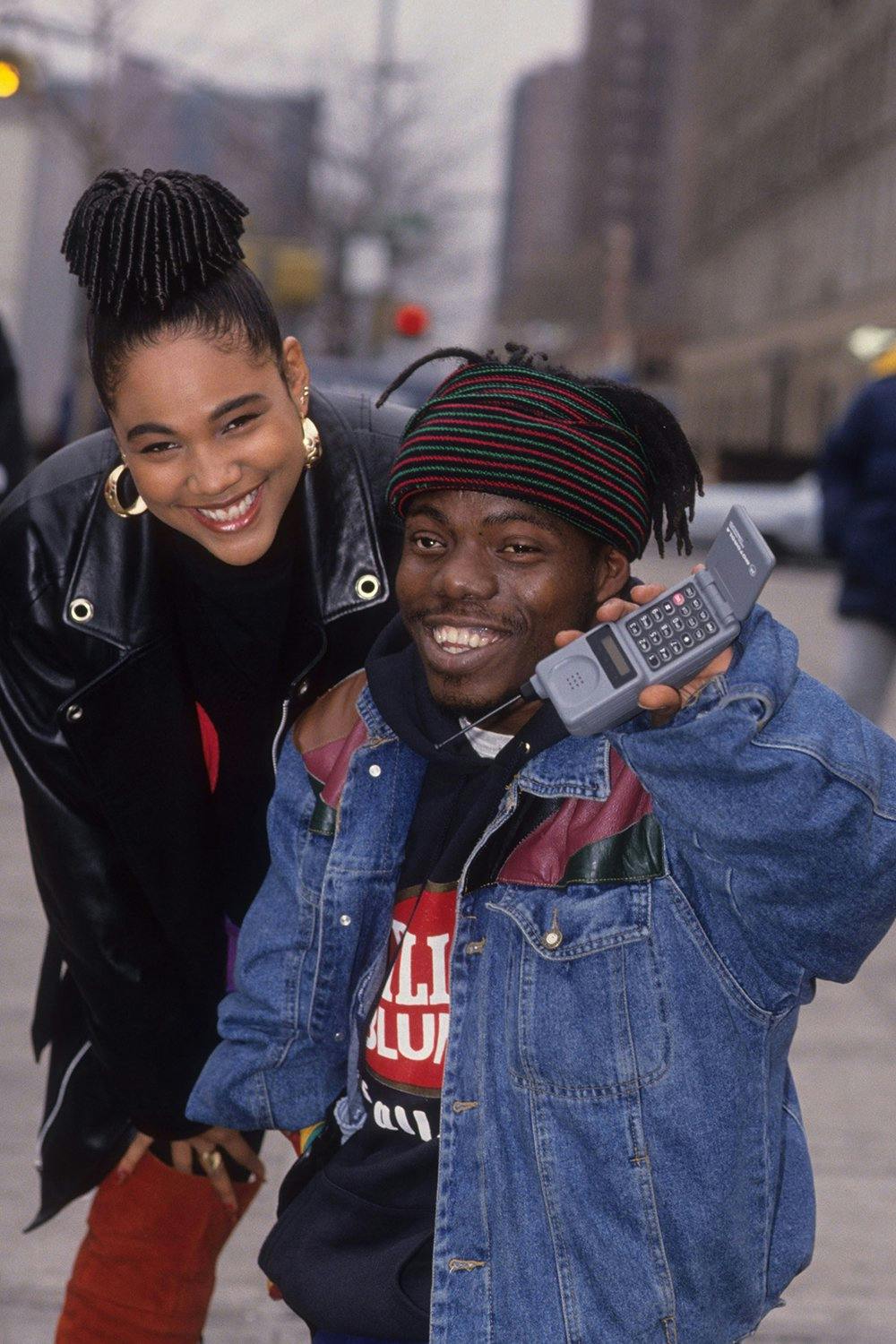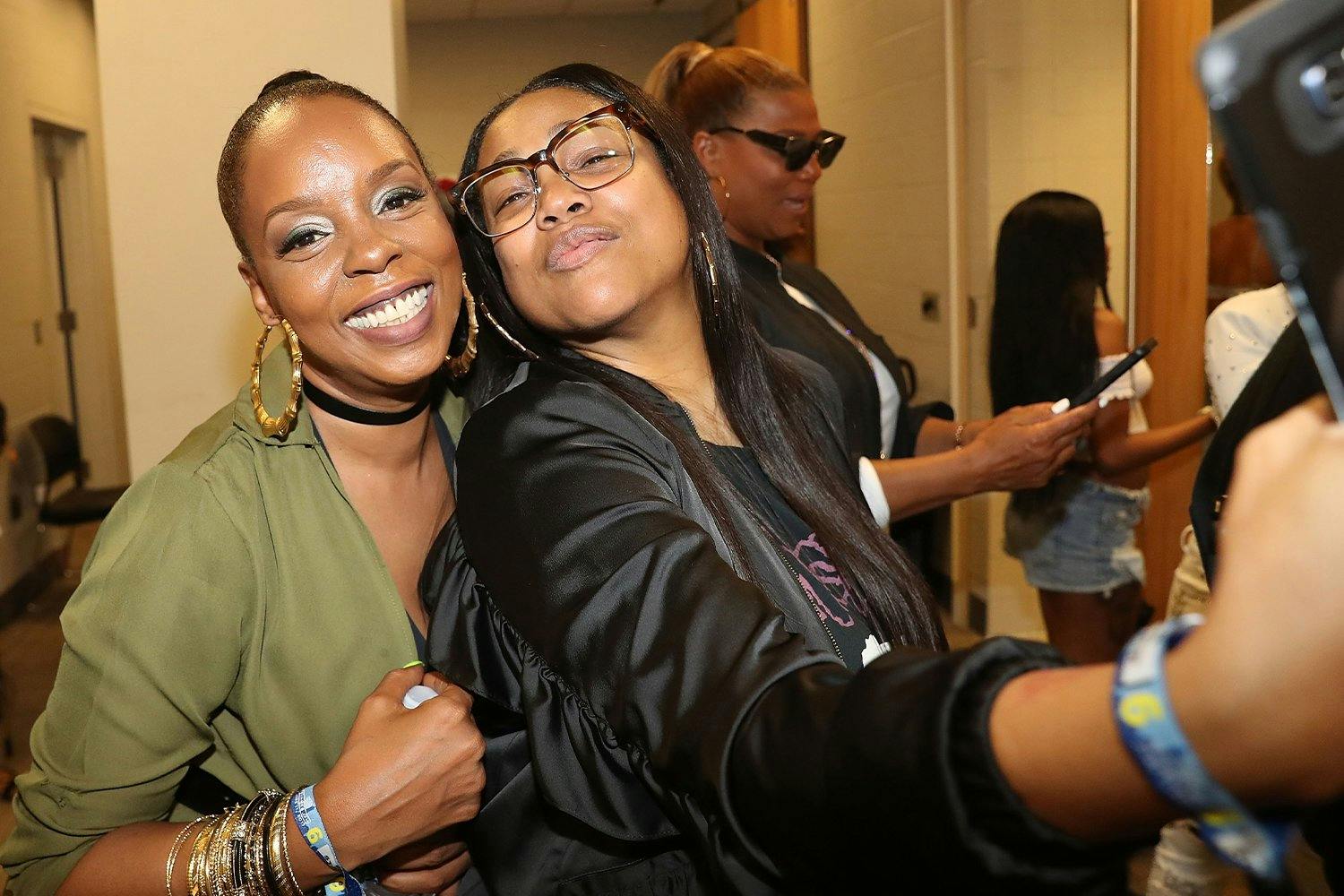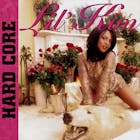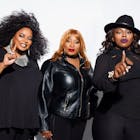
Classic Albums: 'Down To Earth' by Monie Love
Classic Albums: 'Down To Earth' by Monie Love
Published Fri, February 26, 2021 at 2:52 PM EST
Monie Love can rap her ass off.
That may not be news to folks, but revisiting her classic debut Down To Earth makes it more obvious. She has always been a beast on the mic and "Monie In the Middle" and "It's A Shame" are all-timers, but the scope and variety of her debut album Down To Earth is sometimes glossed over when talking about her career and talent. And let's be clear: Down To Earth is one helluva debut album.
Born Simone Wilson in London, it was her father's love and appreciation of music and embrace of spirituality that were major factors in her early life. "I was heavily influenced by my father's faith, his level of meditation, his vibes, his chillness. Flowing into the vibes of the music he listened to."
Young Simone was a b-girl in London initially before developing her skills as a young affiliate of the Cookie Crew. "I have to remind people that I was the Cookie Crew's 'little sister,'" she said in a 2018 appearance on Talib Kweli's podcast. "The Cookie Crew was first, as far as putting women in the U.K. on the map."
Christened "Monie Love," she was mentored by the pioneering group and credited them for teaching her professionalism as a Hip-Hop artist. In the late 1980s, Monie started releasing her own music and making more noise as a solo artist. Female rappers like Betty Boo and the She Rockers were suddenly starting to get more attention in Great Britain, but, early on, the mainstream wasn't embracing the kind of Hip-Hop Monie Love was creating.
"Around the same time, the Top 40 music scene acquired a more acceptable form of what I was doing, which was Betty Boo," Monie recalls. The U.K. Hip-Hop scene and press began working to manufacture bad blood between Monie and the She Rockers. "Nobody knows anybody," she said. "How can we have a problem with each other?"
Monie blamed friction between her and the She Rockers on media hype in the U.K. And over time, she eventually became close with the She Rockers. And she recognized that Boo was something the industry wanted to push. The biracial Boo fit the mold of a standard pop star at the time. "Betty Boo's [image] was more presentable to the Top 40 market than mine. Because they could understand that."
But she understood that her career wouldn't move forward until she moved across the pond. She knew that a move to the United States was imminent. With a sizeable buzz, she set her sights stateside.
"It happened after I had a series of songs out that made noise," she told BBC Radio 1 Extra. "That had me on the Top of the Pops, The Wide awake Club...I did everything. And then there was, like, a ceiling."
After relocating to New York City in 1989, Monie connected with the Jungle Brothers; and it threw her into the mix with the Native Tongues collective. That crew included stars like A Tribe Called Quest, The Jungle Brothers, De La Soul, Queen Latifah, and now, Monie. Love's breakout appearance in the U.S. would be a scene-stealing guest verse on Latifah's hit "Ladies First." She would also guest on De La Soul's "Buddy," the Jungle Brothers' "Doin' Our Own Dang;" and Baby Bam of the J.B.'s would agree to help produce Monie's debut album.
DROP YOUR EMAIL
TO STAY IN THE KNOW
Of course, it was Monie's singles that drew the most attention.
And it was for good reason: she showcased a knack for catchy hooks and a rapid-fire flow that was perfect for radio hits. "Monie In the Middle" caught fire in the summer of 1990, a song about an unrequited adolescent crush and an obnoxious would-be suitor who won't leave young Monie alone. The song became a hit on rap radio and the charts and made Monie Love a household name. Follow-up single "My Sister" sampled the Spinners classic "It's A Shame" and was another radio-friendly success.
Along with "Grandpa's Party," these songs pushed Monie Love's debut album onto the mainstream radar. Down To Earth wasn't a major seller, but it was marketed in a way that made the project accessible to both shopping mall fans of acts like Salt-N-Pepa and Kid N Play, as well as artsier listeners who may be more into the Native Tongues. The project sits somewhere between those two approaches, but the singles leaned more heavily towards pop-friendly story raps. That shouldn't be a revelation: singles tend to be the most accessible and radio-oriented songs by definition and design. But in the case of Monie Love, it could be argued that the singles misrepresented the diversity and scope of Down To Earth.
In the late 1980s, early 1990s, there were few major commercial successes for women in Hip-Hop. No solo female rap artist had yet released an album that had gone gold or platinum; Salt-N-Pepa had enjoyed million-sellers, but major acts like MC Lyte and Queen Latifah, despite their successes, hadn't seen that kind of popular breakthrough. With Hip-Hop breaking through on the pop charts, there were attitudes that emphasized radio-friendly singles to get artists out there beyond rap radio. On Down To Earth, Monie Love exhibited a topicality that was more direct than Latifah and a sonic diversity that Lyte had yet to embrace; crafting an album that showcased a young woman with an ideology more akin with Brand Nubian and the Jungle Brothers.

I think my [change] is a lot of the vocabulary that I use...[it] is a lot of British mannerisms. That gives me a little thing that's different. The fact that I can switch accents."
- Monie Love, (1990)
Monie's unique flow made her stand out from the pack, and her catchy singles made her a star. But when one listens to Down To Earth, it's clear that she has always had a socio-political perspective in her music that was underappreciated. The album's deep cuts run the gamut from verbal body slams of misogynists and women scheming on her man ("Pups Lickin' Bone") to painful looks at abuse ("Just Don't Give a Damn") and a harangue about not eating pork ("Swiney, Swiney"). 30 years later, the album serves as a reminder that so many "Golden Age" rap albums juggled topicality, fun and quirkiness with genuine aplomb.
The Jungle Brothers-esque "Read Between the Lines" might be the best track on the album; an anthem celebrating knowledge of self and spirituality. "I Do As I Please" is Monie declaring her autonomy over a defiant rock guitar-driven riff. On the moody "Race Against Reality," Monie addresses the idea that racism and misogyny have been internalized by Black folks; while "Detrimentally Stable" is a clear-eyed examination of how her inner strength is a product of the oppression her people have faced and the wisdom her family has passed down. "What I'm Supposed To Be" is a statement of self-definition that serves as a put-down of men and racists and anyone who would try to dictate who she is "supposed to be." Alongside a debut of understated scope and stirring perspective, both major singles ("Monie In the Middle" and "It's A Shame") would be nominated for Grammys.


On Down To Earth, Monie Love's themes of sisterhood and Black empowerment sit alongside those earworm singles to provide an interesting mix of accessibility and topicality. Those principles would define her entire career.
The success of Down To Earth set Monie's career in orbit and made her one of the first British rappers to achieve worldwide success.
She would go on to collaborate with Whitney Houston on her hit single "My Name Is Not Susan;" with Prince (both on Monie's 1993 sophomore album In A Word Or 2 and as a ghostwriter for his then-protege, Carmen Electra); branch out into acting in films and eventually becoming a successful radio personality. Today, Monie Love is one of the most respected women in Hip-Hop because of her candor and a career built on staying true to herself.
In hindsight, maybe the powers-that-be realized they'd missed an opportunity with Down To Earth. On streaming sites today, the album's cover isn't the pastel-colored, D.A.I.S.Y. Age-evoking original image; now it's a starker, more serious picture of Monie in an African headdress. Regardless of the artwork; Down To Earth is still a fully-formed debut that highlights an artist with a strong idea of who she is as a woman and as an artist. "Monie In the Middle" may have been the big hit, but there's so much more there for those who have never taken a deep dive into Monie Love's discography. Down To Earth is a young woman's declaration of self, and in Hip-Hop, that should always be celebrated.






